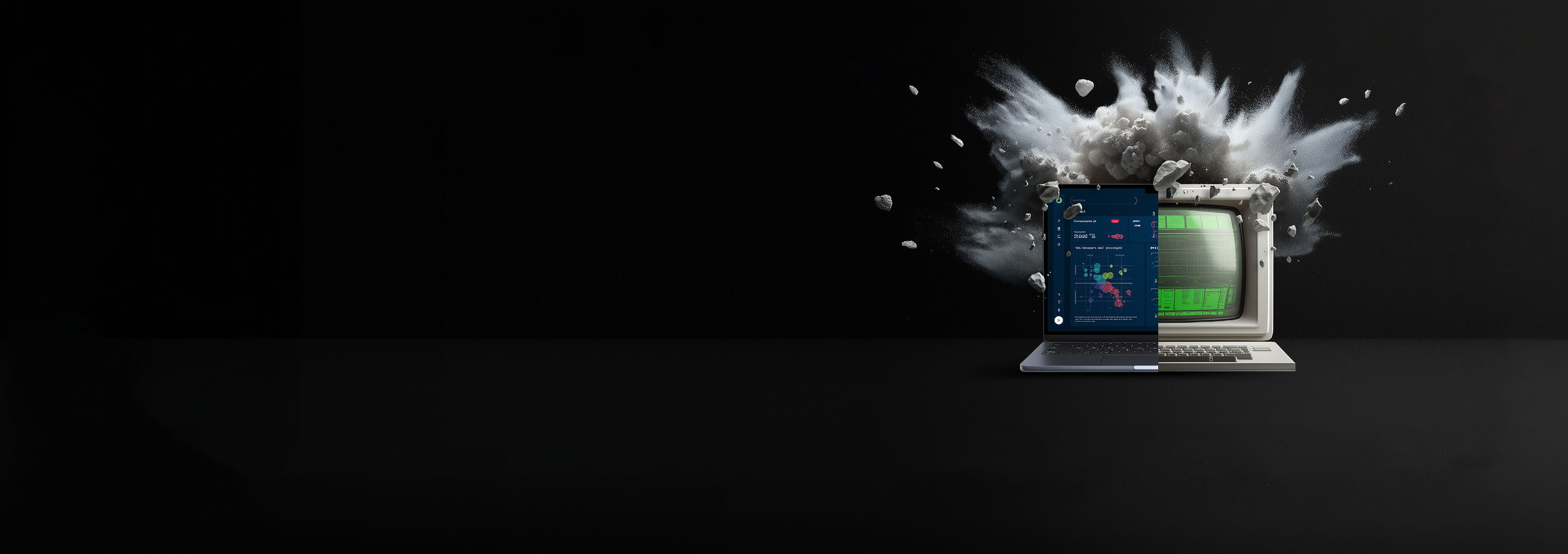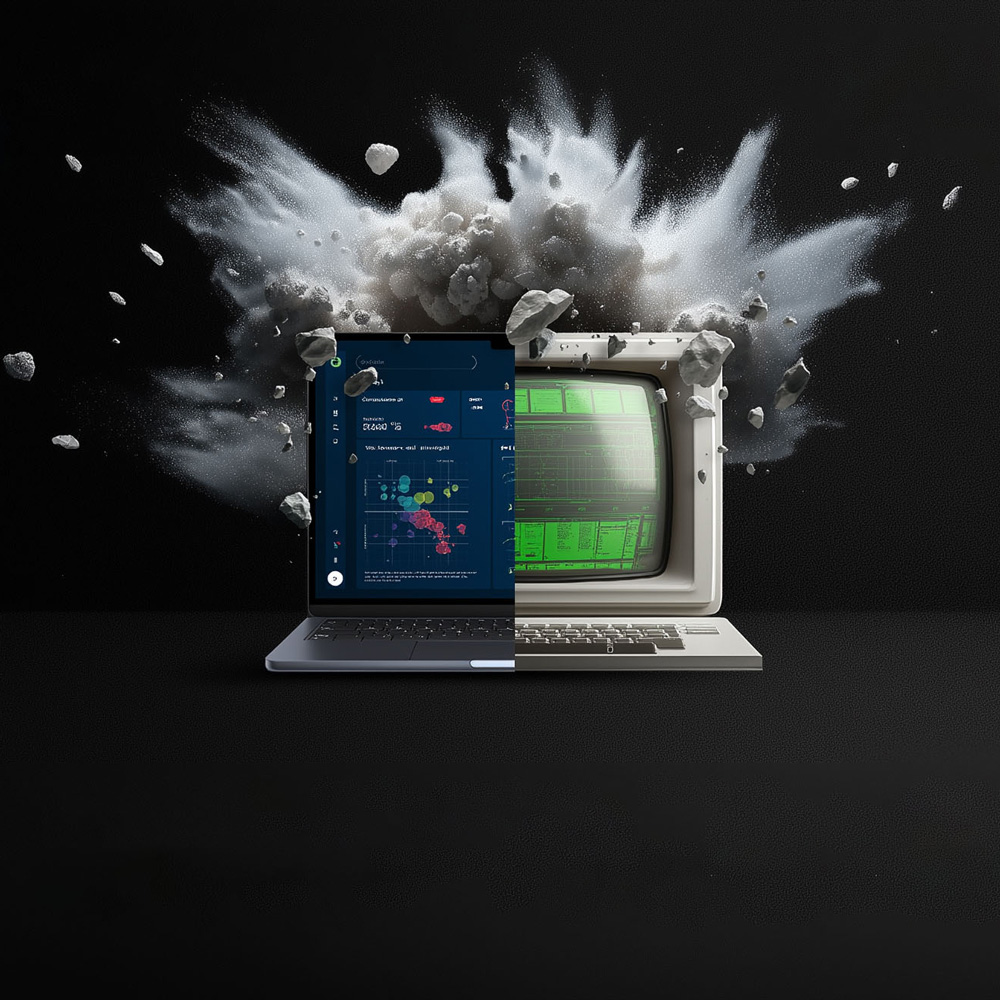

Software ModernisationSuccessfully updating legacy systems
We'll guide you step-by-step through the modernization of your software and secure your competitive advantage.
- Cost reduction through better maintainability and the highest safety standards
- Modern appearance through contemporary UI design
- Better accessibility through intuitive user standards in UX design
- Expanding customer base through operability on future-proof devices and AI integration

The most important facts in 30 seconds
- Outdated systems are holding you back: Lack of flexibility, poor user experience and technological limitations are holding back your growth.
- Modernise for more success: Build a resilient digital product landscape with AI, UX/UI design, automation and microservices.
- Gradual transition: Modernise without costly downtime thanks to proven methods.
- Measurable benefits: Lower operating costs, higher productivity and satisfied customers.
IT modernisation can help companies save up to 50% on maintenance costs, improve system reliability by 74% and increase sales by 14%.
Software modernisieren:
Alle Details in < 8 Minuten
Neubau oder schrittweise Erneuerung? Wo fängt man am besten an?
In diesem Video zeigen wir, warum Softwaremodernisierung kein Alles-oder-Nichts ist und wie man bestehende Systeme risikoarm, nutzungszentriert und kosteneffizient weiterentwickelt.
Sie erfahren, wie Nutzungsdaten die richtigen Entscheidungen lenken, warum frühe Tests mit echten Usern entscheidend sind und wie moderne Web-Standards, UI-Frameworks und KI-Ansätze dabei helfen, alte Software Schritt für Schritt in eine moderne, skalierbare Lösung zu verwandeln, ohne Nutzer*innen zu verlieren.
How a legacy system slows down your company - and what you can do about it
Many companies are faced with the challenge that their legacy system no longer meets modern requirements. The consequences are often underestimated: high operating costs, falling productivity and growing uncertainty among customers and employees. What was initially considered an acceptable ‘interim solution’ quickly develops into a cost and risk factor that blocks opportunities for growth and innovation.
The biggest risks if you keep your old system
Outdated and incomprehensible operating concepts
Operating concepts are constantly evolving and end users expect an ever better user experience. Products with inadequate usability are being rejected more and more quickly. New, up-and-coming companies are focusing on user-centred approaches to optimise productivity and the user experience. As a result, they are developing into serious competitors for established companies in the long term.
Continuously rising maintenance costs
Old technologies require more maintenance and specialised expertise. Qualified developers with expertise in old technologies are becoming increasingly rare and therefore increasingly cost-intensive. Maintenance, patches and emergency repairs quickly add up - a cost block that is constantly rising.
Missed market opportunities & slow innovation
Instead of providing new functions quickly, outdated technologies often require extensive customisation. Meanwhile, agile competitors pass you by and offer more modern solutions.
Security gaps &
compliance risks
Outdated systems often lack important updates and security standards. This increases the risk of cyberattacks and can quickly lead to compliance violations - with expensive legal consequences.
Limited scalability & performance
Legacy systems are usually not designed for increasing user numbers or data volumes. As your business grows, your system becomes a drag, causing performance problems and capacity bottlenecks.
Employee and customer frustration
If internal processes are bumpy and the software responds slowly or unreliably, staff motivation suffers. At the same time, customers lose confidence in your digital services.

Accelerate software modernisation with AI automation
Die Modernisierung Ihrer Software war nie kostensparender als in Zeiten von KI-Agenten. Dank generativer LLMs, neuester Computervision-Modelle und serviceorientierten Architekturen können Teile der Migration nicht nur automatisiert umgesetzt, sondern auch automatisiert getestet werden, indem die Features des Altsystems mit den Features des neuen Systems von virtuellen KI-Agenten abgeglichen werden.
Lesen Sie zu den neuen Möglichkeiten, die KI-Agenten bieten, das Whitepaper unseres Geschäftsführers und KI-Experten Thomas Immich.
Medical laboratory solutions with 40% less susceptibility to errors


Comprehensive software solutions for medical laboratories
We developed innovative software solutions for medical laboratories for Tecan. The modernisation included a powerful dashboard, an intuitive test editor and a process-safe UI template - all built on modern software architecture with future-proof technologies.
- Fewer user errors
- Faster test execution
- Lower maintenance and development costs
Why now is the right time to modernise your enterprise software
More and more companies are realising that they need to upgrade their technology in order to remain competitive in the digital age. Cloud computing, microservices, UX/UI design, AI and automation are developing at a breathtaking pace - those who wait too long will miss out on opportunities and run the risk of being left behind. Especially in times when market requirements are changing rapidly, an agile and scalable software landscape is the basis for sustainable success.

Current market and technology trends
Accelerated innovation cycles
New products, services and features are coming onto the market faster and faster.
Those who act flexibly can capitalise on trends before the competition and exploit growth potential at an early stage.
Growing importance of AI
Artificial intelligence is increasingly being integrated into everyday processes (e.g. via chatbots, usage data analysis or computer vision)
A modern software setup facilitates AI implementations that would otherwise fail due to outdated structures.
Expectation of digital user experience
Customers and employees demand intuitive, high-performance applications - whether internal or external. In addition, it is often expected that modern applications can also be operated or explained in natural language via chatbots.
An outdated software architecture is often no longer able to cope with fast processes and appealing interfaces.
Modern technology and many target platforms
New target platforms must be specifically addressed, while users are increasingly accessing products and machines collaboratively.
New technologies enable provision on versatile target platforms, including mobile devices such as Android smartphones, iPhones or iPads, and support seamless remote operation of products and machines - for maximum flexibility and efficiency.



Arrange a meeting with our engineering team immediately.
The most important advantages of software modernisation
Even though the pace of new technologies is rapid, switching to modern systems doesn't have to be complicated. With well thought-out software modernisation, you can create the basis for greater efficiency and competitiveness - without jeopardising your ongoing operations.
Here is an overview of the most important benefits:
Significant cost savings
Optimised architecture and more efficient use of resources will reduce your IT costs in the long term. You can invest the freed-up budget directly in innovation and strategic projects.
Greater agility
A modern infrastructure allows you to realise market-oriented product developments more quickly. This allows you to react more flexibly to new requirements and secure a competitive edge at an early stage.
Improved data security & compliance
Thanks to the latest frameworks and automated updates, you reduce the risk of security vulnerabilities. At the same time, you support reliable compliance with legal requirements (e.g. GDPR).
Increased employee productivity
Fast, intuitive tools and clearly structured processes increase your team's motivation and reduce sources of error. This saves time and simplifies collaboration at the same time.
Optimierte Kundenerfahrung
Stabile und leistungsfähige Systeme sorgen für reibungslose Interaktionen, sei es an Bedienoberflächen (HMI) in industriellen Anwendungen oder im Service-Portal. Zufriedene Nutzer*innen bleiben Ihnen länger treu und tragen zu einem positiven Markenimage bei.
Future-proof scalability
Thanks to cloud-enabled, modular architectures, you can seamlessly integrate new functions and manage increasing data volumes with ease. This lays the foundation for sustainable growth and innovation.
Cloud migration with 85% efficiency increase in quality management


Intuitive quality management for textile factories
In close collaboration with Uster Technologies, we developed a comprehensive cloud-based system to optimise quality management in cotton processing. Our Angular-based app shell architecture makes it possible to seamlessly integrate different micro-frontends and offers maximum flexibility for future extensions through independently loadable components.
- Fully automated quality data acquisition
- Error reduction and fewer rejects
- Time savings through real-time reporting
Comparison: Legacy vs. modernised software
| Crtiteria | Legacy (old software) | Modernised software |
|---|---|---|
| Security & Compliance | Security gaps, outdated standards | Current security frameworks, GDPR-compliant, minimised risk |
| Performance & scalability | Slow loading times, limited scaling | Fast and stable processes, flexibly expandable and cloud-capable |
| Integration & APIs | Complex or missing interfaces to third-party systems | Seamless connection of modern tools, API-first approaches |
| User experience | Unclear interfaces, high risk of errors | Intuitive operation, optimised workflows, higher productivity |
| Innovation & AI | More difficult use of new technologies (e.g. AI, microservices) | Simple integration of AI solutions, future-proof architecture |
| Overall benefit | Slows down digital transformation, often causes high costs | Increases competitiveness, reduces IT costs and promotes agility |
What methods are available to bring your application up to date?
Not all software needs to be completely replaced - there are different modernisation strategies depending on the system and the company's objectives. The system can be modernised iteratively so that existing processes are not interrupted.

Overview of modernisation strategies
| Method | Description | Perfect for... |
|---|---|---|
| Replatforming | Adaptation of the software to modern platforms with minimal changes | Minor changes for greater efficiency |
| Refactoring | Improvement of the code without changing the functionality | Optimierung ohne Komplettumbau |
| Rearchitecting | Restructuring of the software for better scalability | Systems with high loads |
| Rebuilding | New development utilising the latest technologies | Legacy systems that no longer meet current requirements |
From WPF to HTML5 - Award-winning modernisation project


Award-winning HMI design system
For the mechanical engineering market leader TRUMPF, we developed an award-winning software platform that solves complex HMI requirements with modern technologies. Using C#, XAML and HTML5, we implemented a standardised operating concept that generates adaptive interfaces for different machine types and supports advanced interaction patterns such as gesture control for 3D models.
- Modular software architecture for different machine types with a standardised codebase
- Increased operating efficiency
- Fewer failures due to operating errors
We take over the modernisation of your legacy systems - Our process
In a fast-moving, digital world, an outdated IT landscape can quickly become a competitive disadvantage. With our proven modernisation process, we bring your systems up to date - without downtime and with measurable added value for your company.
Targeted inventory & business impact
We analyse your existing software landscape and specifically identify the areas in which you can realise the greatest added value - for example through cost reductions, higher performance or faster time-to-market.
User requirements engineering
We analyse the needs of your users in various application scenarios, based on interviews and usability tests, and then prioritise the features that meet core needs over features that are only ‘nice-to-have’.
UX & UI Design
Based on the prioritised features, we develop modernised operating concepts and present them in an appealing and contemporary UI design.
Prototyp & Roadmap
With the modernised UX & UI design in mind, we create a proof of concept to make the planned improvements tangible. We then develop a clear project roadmap that is aligned with business goals and profitability from the outset.
Modernisation without downtime
With proven migration methods and intelligent architectures, we ensure that your systems remain available at all times. Thanks to our iterative approach, you benefit from initial results during the project - without interrupting your day-to-day business.
How do you measure the success of software modernisation?
The success of a modernisation can be measured using various key performance indicators (KPIs). What is important here is not only improved performance, but also long-term cost savings and greater user-friendliness.
- Performance improvement: Does the software run faster & more stable?
- Cost savings: Less maintenance & operating costs?
- User satisfaction: Positive feedback from users and users?
- Scalability: Can the system grow without causing problems?
Example of successful modernisation:
| Before | After |
|---|---|
| Static and outdated UIs | Modern, animated user interfaces that improve the user's understanding |
| Local and non-collaborative | Working together remotely |
| High error rate due to unintuitive operation | Reduces human error ensures fewer failures and incorrect data |
| Incomprehensible navigation and slow operation | Faster workflows thanks to optimised UI/UX |
Frequently asked questions
Software-Modernisierung bezieht sich auf den Prozess, alte Legacy-Systeme zu aktualisieren oder zu ersetzen, um sicherzustellen, dass die Software auf dem neuesten Stand der Technologie bleibt. Dies ist wichtig, da viele Unternehmen auf moderne Technologien angewiesen sind, um ihre Geschäftsprozesse effizient zu gestalten und wettbewerbsfähig zu bleiben.
Die Modernisierung von Legacy-Systemen kann zahlreiche Vorteile bieten, darunter verbesserte Leistung, geringere Wartungskosten, bessere Sicherheitsstandards und die Möglichkeit, neue Features zu integrieren, die den Anforderungen der Anwender besser entsprechen.
Zu den häufig eingesetzten Methoden für die Migration von Legacy-Systemen zählen die vollständige Neuentwicklung der Software, die schrittweise Migration auf moderne Plattformen, die Nutzung von Cloud-Lösungen sowie die Implementierung von „as a Service“-Modellen.
Bei der Auswahl eines Partners für Software-Modernisierung sollten Unternehmen auf Erfahrung, technische Fähigkeiten, Referenzen und die Fähigkeit achten, spezifische Anforderungen zu verstehen und maßgeschneiderte Lösungen anzubieten.
Zu den Herausforderungen gehören die Komplexität der bestehenden Systeme, die Schulung der Anwender*innen, das Management der Datenmigration und die Sicherstellung einer nahtlosen Integration der neuen Lösungen in die bestehenden Geschäftsprozesse.
Der Modernisierungsprozess wird individuell auf Ihr System und Ihre Geschäftsanforderungen zugeschnitten. Während der gesamten Projektlaufzeit, die je nach Umfang mehrere Monate bis über ein Jahr betragen kann, stellen wir durch eine strukturierte Vorgehensweise einen unterbrechungsfreien Betrieb sicher.
Wir setzen Cloud-Technologien gezielt dort ein, wo sie einen echten Mehrwert für Ihre Modernisierung bieten. Auf Basis Ihrer individuellen Anforderungen entwickeln wir die optimale Strategie – mit Cloud-Komponenten oder als On-Premise-Lösung.
Eine umfassende Software-Modernisierung kann Geschäftsprozesse optimieren, indem sie die Effizienz steigert, die Nutzungserfahrung verbessert und die Integration neuer Technologien ermöglicht. Dies führt letztlich zu einer höheren Produktivität und Kosteneinsparungen.
Zu den neuesten Trends in der Software-Modernisierung gehören der Einsatz von künstlicher Intelligenz, Automatisierung und leistungsstarken Webtechnologien wie React, Angular und Vue.js. Kombiniert mit Microservices-Architekturen und Cloud-Technologien entstehen so flexible und zukunftsfähige Systeme.



Our experts are on hand to discuss your individual requirements and provide customised solutions.
Let's talk about your software modernization.
Let's talk about possibilities for your digital product development. Whether it's software modernization, AI-supported agents & automation, UX & accessibility optimizations, or gamification & serious games: in a free initial consultation, I'll be happy to give you exciting insights into my many years of project experience in the B2B environment.

Kai-Dominik Kuhn
Head of Engineering · Senior Software Engineer